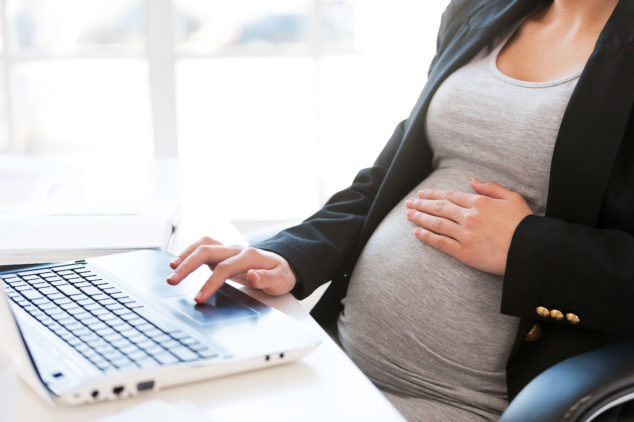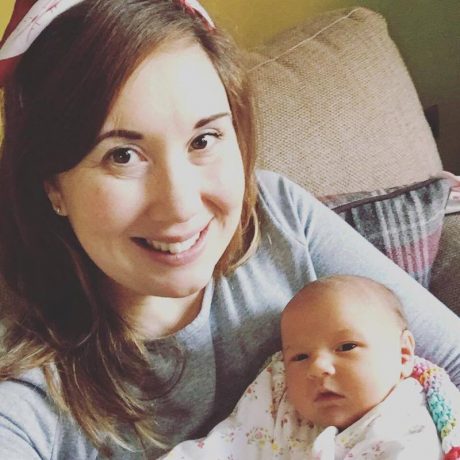Maternity Pay For UK Mum’s Is Among The Worst In Europe
| 26th March 2017

THE Trade Union Congress (TUC) ranked UK statutory maternity pay amongst the worst in Europe after it came 22nd out of 24 countries. Only Ireland and Slovakia have worse “decently paid” entitlements. Decently paid is defined as two-thirds of a woman’s salary or more than £840 a month.
Croatian Mums are supported with six months decently paid maternity leave, and Poland, Hungary, Czech Republic are next, with more than four months. Estonia, Italy, Spain, Belgium, Denmark, France, Malta, and Switzerland offer more than three months.
However in the UK, mothers are only entitled to six weeks decently paid maternity leave before it is reduced.
VIVA magazine spoke to two Mums currently on maternity leave; Victoria Clark-Leece, 35, from Greater Manchester is Mum to Ethan, Charlotte, Hayden and Isabelle, she told VIVA:

Mother Victoria with her daughter Isabelle
‘I had to begin my maternity leave much earlier than I had intended to. I suffered pelvic girdle pain and couldn’t carry on. I received three months full pay from my employer and the remaining 39 weeks are at statutory mat pay which is £139 per week.
‘I know, I may have to return to work early if I cannot afford to pay bills and feed/clothe us all. However, I am trying my hardest to stay at home for as long as possible because the benefits of me caring for the baby and spending time with the family, far out way money.
‘I am shocked that as a first world country, that can afford to support families the employers/government, choose not to. I believe helping young families should be a priority. It’s not healthy for parents to miss out on bringing up their children’.
Victoria said: ‘All the current policies are about providing childcare, to get Mothers back to work as soon as possible, very little value is placed on parents staying home and caring for their child/ren’.
Julie Callun, 37, from Taunton is Mum to Mason, aged 4 and Amber, who is 2-weeks old.

New baby, Amber with her proud big Brother, Mason
Julie said: ‘I worked as late as possible so I can have longer at home with the baby. I worked as long as I could and only finished work three weeks before my due date, taking 2 weeks annual leave first. I felt pressure to stay in work as long as possible because it was important to me to have as much time as I could at home after the birth. Towards the end, it felt very uncomfortable to be sat at my desk; I was so was ready to leave before I did.
‘I now receive statutory maternity pay which is a big drop in income for the family. It has left a massive gap in our finances and we have had to save hard to make sure we have additional funds to cover our household bills whilst I am on leave.
‘To prepare for this I increased my hours of work 18 months prior to having our second baby, so I could save. We have to rein in our spending during maternity leave so I can stay off as long as possible especially as I want to take the full year which means 3 months with no income.
‘We had to wait for to have my second baby due to the financial burdens with childcare, we knew we couldn’t have them closer together due to the cost of childcare for two children. It doesn’t surprise me that the UK ranked so low, I don’t think the government and employers have really understood maternity pay and rights. I would like to see maternity pay based on salaries rather than a capped pay’.
The TUC argues that statutory maternity pay should be at least as much as the minimum wage so mothers do not have to return to work prematurely.
“The UK is in the relegation zone when it comes to decently paid maternity leave,” said Frances O’Grady, general secretary of the TUC.
“Many European countries offer decent support to new mums, but lots of parents here are forced back to work early to pay the bills.”
The analysis is based on research by the Leave Network, an international group that analyses and researches leave policies.
What are your rights?
Most employed mothers are entitled to 52 weeks’ maternity leave
Statutory maternity pay for eligible women is usually paid at 90% of their weekly wage for the first six weeks, with the remaining 33 weeks at £139.58 a week or 90% of their weekly wage, whichever is lower
Women who earn less than £112 a week are not eligible for statutory maternity pay; instead most can claim maternity allowance.
While some companies have more generous schemes, Ros Bragg, from the campaign group Maternity Action, said the “vast majority” of women in the UK received statutory maternity pay. Employers then claim this back from the government.
The TUC also thinks shared parental leave should be more flexible – so parents can take their leave in smaller chunks, rather than all at once.
